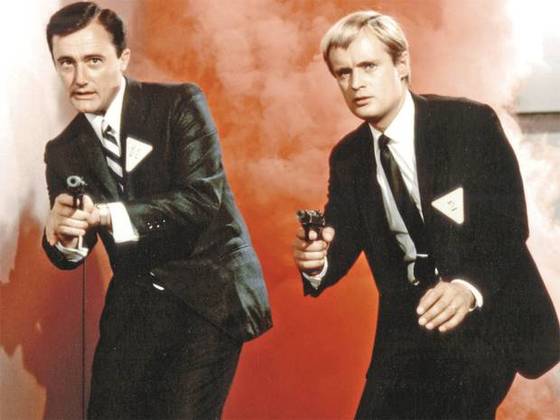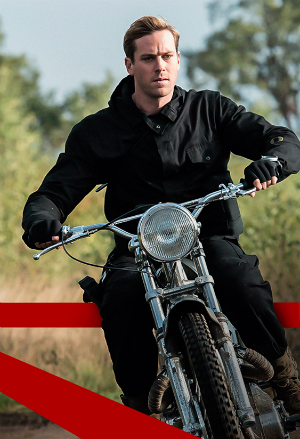6 Ways Guy Ritchie Drops the Ball on The Man From UNCLE and 4 Reasons to See It Anyway
 |
I first came upon the original Man From UNCLE TV show after learning who Robert Vaughn was from Superman III. My dad, ever eager to introduce me to the pop-culture of his youth, used the opportunity to segue me into reruns of the show, and I was hooked – while I may not have experienced it in first-run, I did (in that pre-VCR time) experience it as something I did not want to miss every week, as American agent Napoleon Solo and Russian agent Ilya Kuryakin teamed up and saved the world with gadgets like Bond and less of the yucky kissing parts.
It’s nicely coincidental that if today’s kids get into the property, it will also be due to a Superman connection, with modern Man of Steel Henry Cavill stepping into Vaughn’s stylish shoes. Kyle MacLachlan would have been my choice once upon a time, but these days even he’s considered too old for such a part.
I’m not sure how many other modern fans of the show remain, so it’s up to me to carry the banner and assess how well the movie does in pulling off a new take. And as you can tell by the headline, we’re going to start with the ways I think director Guy Ritchie made like a Stormtrooper…and missed the target.
1. Ritchie Doesn’t Seem to Know That U.N.C.L.E. Is an Acronym.
MINOR SPOILER:
The word “UNCLE,” as it’s meant in the title, is only uttered once, at the very end of the movie, where it’s described as a “codename” and “appropriate.” The insinuation, to somebody who doesn’t know the source material, is that beacuse one of the key characters in the movie was somebody’s uncle, it’s an ironic nickname given by a higher-up who’s trying to be funny. END SPOILER
It’s left to the end credits to show a document that spells out “United Network Command for Law and Enforcement,” like a last-minute studio note that Ritchie ignored until everybody realized it was too late.
Forget about arch-enemy organization THRUSH. They – if indeed it is them – are only referred to as “an evil organization.” Perhaps, like Spectre in the modern Bond movies, they’re saving it to be the name of the sequel. Or they just wanted to avoid yeast infection jokes.
2. It Makes You Wish It Were Quentin Tarantino’s James Bond Instead.
QT has gone on record several times saying he’d like to make his version of Ian Fleming’s Casino Royale, set in the ’60s and with his own distinctive directorial voice. Well, Fleming ironically enough is the original creator of lead UNCLE character Napoleon Solo (though not the show as a whole), and Tarantino is unintentionally the creator of Guy Ritchie’s whole directorial career, so it’s a bit like you got the Asylum “mockbuster” version.
When it comes to doing “Tarantino, but English,” Ritchie has the style down – the period songs, the snappy dialogue, the split framing and the bright yellow subtitles in retro-font. But while Tarantino at his worst is just the sum of these quirks, at his best he uses them as window-dressing to mask the escalating tension that lies beneath. Ritchie is all about the trappings, which becomes a problem in the moments when they fail him.
3. Speaking of Which….
 |
I’m not going to describe the specifics of what happen in the movie’s climax, but the point is that this is precisely where style fails. Having been unable to choreograph an interesting final fight or chase (and thrown in an incongruously modern vehicle to this ’60s-era battle), Ritchie opts to chop it all to hell in the editing room and crank up the music really loudly, hoping that can save what little is there.
It may work for some people – if your’e one of those who still insists Gladiator deserved its Oscars for Best Picture and Best Editing, lucky for you the folks who put together this grand finale seem to agree. Those of us who think the TV show was fine and good with actual plot-driven endings will be nursing our arthritis pains and telling y’all to get off our lawns.
4. As a Reboot, It’s a Missed Opportunity.
Napoleon and Ilya didn’t really get an origin story on the TV show – they came to us fully formed as friends and partners with a witty banter, and in the post Cuban Missile Crisis Cold War, added to a sense of hope that things had calmed down and east and west could find common cause on some things. If you’re not going to do a movie that has UNCLE pre-existing with the main guys already pals, a prequel – or, more accurately, pre-boot – is a good way to go.
The problem is that the movie jumps directly to the most boring part of that backstory – the two men forced to be partners who…wait for it…DON’T GET ALONG! Ilya (Armie Hammer) is presented as a cross between the T-1000 and the Incredible Hulk; he’s the first movie action hero since John Rambo to have his special abilities triggered by PTSD. Napoleon, on the other hand, is a master thief and con-man, expert in pickpocketing and using misdirection with his witty banter; he’s working for the CIA as a way to pay off a potential prison sentence.
And I wanna know how they got that way! I know it’s cliche, but show me these guys as kids developing their quirks. Never mind if it’s campy; The Man From UNCLE is supposed to be campy. Both men talk a fair bit about one another’s backgrounds, but save for some faux-archival slides, we see none of it. Again, it’s left to documents shown under the end credits to fill in a bunch of gaps.
5. Never Facing the Music.
Jerry Goldsmith’s classic theme is referenced in the movie’s end credits, but I never heard it while watching the feature, and that’s both a shame and a crime. Give Tom Crusie some credit, whatever you think of him – he makes sure that earworm of a Mission: Impossible main title is always included, even if that means having U2 or Limp Bizkit mess it up somehow. To fans of the show, it as that integral to the property.
This isn’t a modern Batman movie where “Nanananana” would be out of place – Guy Ritchie’s take on The Man From UNCLE might not be as campy as the show could get, but it’s not entirely serious either. Even a bit at the end of the credits, the way Sam Raimi did with the animated Spider-Man song, might have been a nice gesture.
6. It Misses or Ignores the Crucial Show Formula.
Just as Batman once needed a Robin, super-spies Kuryakin and Solo spent every week protecting an innocent character dragged into a larger scheme (often involving THRUSH) that they couldn’t handle alone. The idea – one that has been lost over the years, but should maybe make a comeback – was that the general public needed a regular human being to identify with.
Alicia Vikander’s Gaby is the character they protect (and use) in this story, but as a tough, tomboyish mechanic from East Germany whose father was Hitler’s top scientist and whose uncle is a Nazi, it’s not really a spoiler to say she’s no average Jane.
And yet….
…The Man From UNCLE is still a fun movie. Here are the main reasons why:
1. Regarding Henry, and Hammer Time.
Henry Cavill and Armie Hammer are great in this, and great together. Curiously, Hammer’s the one who boned up on the TV series while Cavill deliberately stayed away, yet in the end it’s Napoleon who’s far more like his small-screen predecessor. Handsome and well-spoken, with very deliberate enunciating of every syllable, Cavill recalls not only Vaughn’s Solo, but Colin Firth’s elegant Kingsman character through an American filter (ironically, since Kingsman totally stole the original show’s premise of a secret base beneath a tailor shop). The way he reacts when he learns he’s been drugged during a climactic scene sums up the whole performance nicely – let’s just say he does almost the exact opposite of what every other spy movie character would do under the same circumstances.
Hammer is playing a much more stereotypical Soviet than David McCallum – brutish and super-strong, he seems to be more of a rebooted Ivan Drago up until the scene in a clothing store where he and Solo must discuss undercover clothing for Gaby. Even Boris Badenov would not argue cross-culture fashion faux pas with the hilarious intensity of this Ilya Kuryakin.
Now, granted, this is all coming from me, the one guy who liked The Lone Ranger and Man of Steel. But I think the general consensus is that even if you don’t like those, it wasn’t Hammer or Cavill’s fault, right? RIGHT?
Rhetorical question. They were and are great for what they do. Just don’t ask me to sit through Cavill as Theseus in Immortals again.
2. That Magic Moment.
As I was a kid who hated love scenes – but put up with them for the sake of everything else spy movies brought to the table – one thing I really dug about the old show was this: it would often build up to a moment of sex or romance, and then immediately interrupt with action or another person doing something awkward. Weirdly, it was something I felt I could could count on.
It was too much to expect either Hollywood or Guy Ritchie to neuter the heroes utterly, as it is made abundantly clear that Napoleon gets laid at least twice during the course of the story. However, there are also enough cock-block moments to make a drinking game of, and not all are at the expense of poor clumsy brute Ilya. I can forgive just about every other TV-related transgression for that trope being absolutely intact.
3. Hugh Grant as Alexander Waverly.
He’s perfect for it. Nothing more to say there.
4. The Part Where Henry Cavill Basically Ignores That an Action Sequence Is Happening Behind Him so That He Can Drink Wine and Eat Picnic Food While Seated Behind the Wheel of a Stationary Truck.
You’ll understand when you see it. It almost makes up for the terrible editing later.
